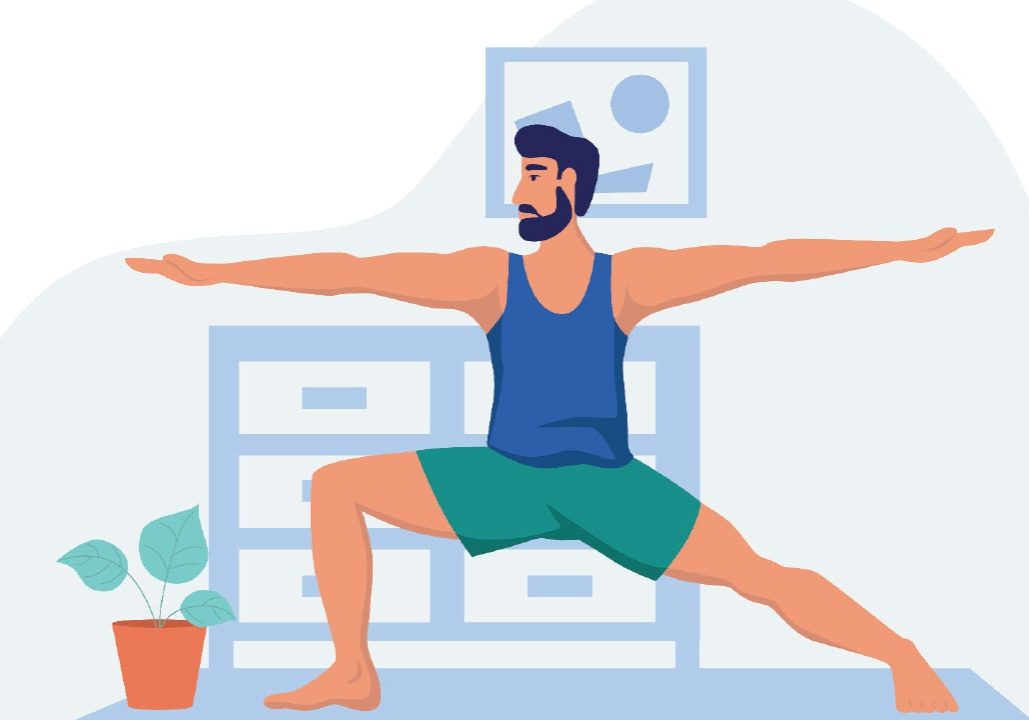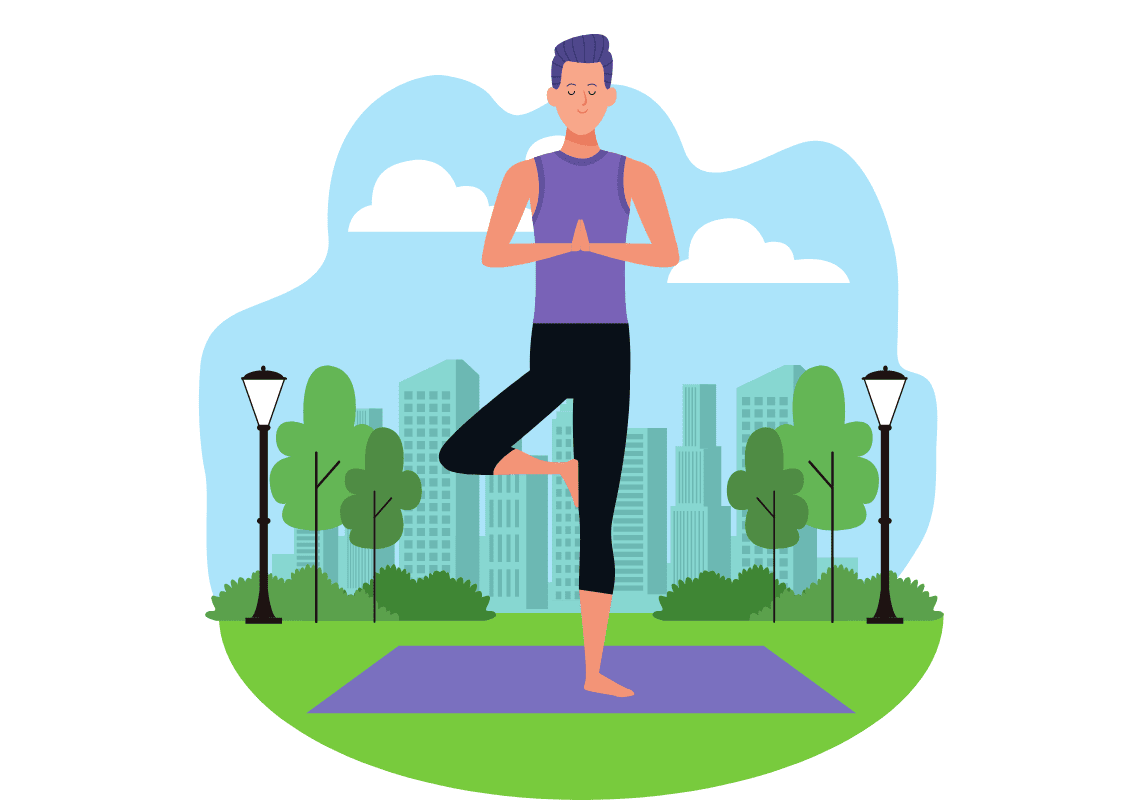
4 ways yoga improves mental wellbeing
Gents, it's time to start taking yoga seriously if you're serious about your mental health
While routinely moving our bodies is a key element in the ecosystem of factors that help us to build our mental and emotional wellbeing, it is rarely employed as an intervention by mental health professionals.
A new report* by the John W. Brick Mental Health Foundation (JWB) called Move Your Mental Health examines over three decades of research on how various forms of exercise and body movement impacts mental health, synthesising over 1600 peer-reviewed scientific studies on how exercise affects brain function and mental health. This report concludes that physical activity should be 'prescribed' for mental health, and used to mitigate mental health risks (prevention) and improve general mental wellbeing for all.
Yoga in particular has a strong scientific basis when it comes to mental wellness. A spiritual path and essential mind-body wellbeing practice for millennia, yoga has proliferated over the past 50 years and now enjoys widespread popularity worldwide. A growing body of research is beginning to confirm what yogis have known for centuries – yoga has a measurable positive impact on not only physical wellness, but also on mental health and wellbeing.
The JWB report identified 215 articles and reports published in the last three decades investigating the relationship between yoga and various mental health outcomes. Of these articles, 93% (199) reported statistically significant positive relationships between practicing yoga and at least one mental health outcome. Not only does the science validate the impact of yoga on mental health, it sheds some light on how and why.
Check out some ways yoga can improve mental wellbeing here:

1. Shifting from 'fight or flight' to 'rest and digest'
You've heard of the fight or flight response, yes? Fight or flight is an automatic reaction to any situation that causes, or could cause, physical or psychological harm, or is perceived as a danger or threat to you. While this likely evolved to content with multiple environmental dangers, like predators, today it is more often activated in response to things like an argument with a friend, a let down at work, disappointing news about a loved one, or a parking ticket. The purpose of the response is to pump you up and get you ready to face or fight the perceived threat, or to get you ready to run away from it – and fast! When activated chronically, this can lead to anxiety, depression, and other stress-related illnesses.
Yoga is thought to help balance the sympathetic nervous system (the flight/fight system) to the parasympathetic nervous system (the rest and digest system). Deep relaxation helps to down-regulate our stress levels and reduce sympathetic activation. And, by intentionally facing the 'stressor' of a difficult pose, while remaining calm, alert, focused and breathing, this builds our ability to more nimbly switch from flight/fight to rest/digest. It builds our 'stay chill in the face of stress' muscle, otherwise known as resilience.

2. Boosting serotonin, the 'feel-good' neurotransmitter
Serotonin plays a key role in mood and behaviour, and increased serotonin levels boosts your mood. Luckily, yoga practices have been found to significantly increase serotonin levels in the body. Not only do levels of serotonin increase with consistent yoga, levels of monoamine oxidase, an enzyme that removes serotonin, decrease with repetitive yoga. Yoga has also been associated with increases in the neurotransmitters GABA (relaxation and contentment) and dopamine (reward).
3. Reducing cortisol, the stress hormone
Research indicates that yoga may not only increase serotonin, but decrease cortisol. Cortisol is best known as the 'stress hormone', but high levels of cortisol are also connected to increases in depressive symptoms. One recent study showed that patients who practiced yoga showed significant reductions in cortisol levels and improvement in their symptoms of depression, along with increasing brain-derived neurotrophic factor (say that five times fast!), or BDNF – deficits of which are connected with low mood.

4. Build stress resilience
Practicing yoga leads to reduced stress in numerous studies, and scientists are just beginning to discover why. A review of multiple studies showed that yoga is associated with less response to stress in the hypothalamic-pituitary axis, or HPA (the reactive part of the brain). In another study, a stressful maths task was given to yoga practitioners versus non-yoga practitioners, and the response of their nervous system and their heart rate variability (which is just what is sounds like – amount of variation in heart rate – which turns out to be a good thing!) was measured. Yoga practitioners showed better recovery after the stressor – what the authors termed "greater autonomic reactivity, flexibility and resilience."
“One recent study showed that patients who practiced yoga showed significant reductions in cortisol levels and improvement in their symptoms of depression.”
So, what does it all mean?
The science is clear: yoga affects the very factors in our brains and bodies that are involved in stress, mood, and wellbeing. It’s a pretty compelling argument to take to the mat and commence your yoga journey, no matter what your age, experience or level of ability. Want to learn more? Check out the John W. Brick Mental Health Foundation’s Move your Mental Health Report, which not only includes more evidence on yoga and mental health, but on 20 other types of movement as well.
Written by Leah Gizzi, Jolie Samuelson, Cassandra Vieten of the John W. Brick Mental Health Foundation (johnwbrickfoundation.org), which works to integrate exercise, nutrition and mind-body practices into
treating mental illness and promoting mental wellbeing for all.
* You can check out the report and play with an interactive data visualisation here: https://www.johnwbrickfoundation. org/move-your-mental-health-report/




